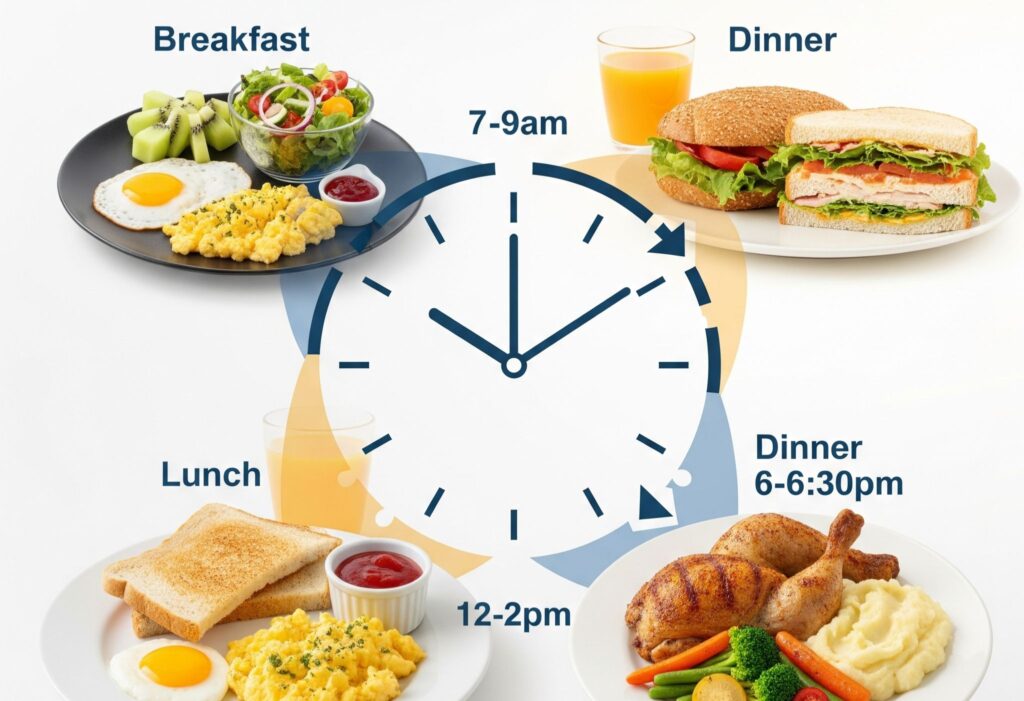Meal Timing and Metabolism: What the Science Says
For years, nutrition advice focused on what to eat—but when you eat might be just as important. Recent research shows that meal timing plays a role in metabolism, fat storage, energy levels, and even sleep quality.
Eating in sync with your body’s circadian rhythm—your natural sleep-wake cycle—may help:
-
Boost metabolism
-
Improve digestion
-
Support weight management
-
Enhance blood sugar regulation
According to Johns Hopkins Medicine, eating too late in the day may disrupt your body’s ability to burn fat and regulate insulin effectively.
Best Times to Eat: A Simple Meal Timing Breakdown
While everyone’s lifestyle is different, here’s a general meal timing guide that aligns with natural energy rhythms:
-
Breakfast (7:00–9:00 AM): Kickstart your metabolism with a balanced meal
-
Lunch (12:00–2:00 PM): Your body’s digestion is strongest—make this your biggest meal
-
Dinner (6:00–7:30 PM): Keep it light and early to allow for proper digestion before sleep
-
Snacks: If needed, enjoy small snacks mid-morning or afternoon, ideally spaced 3–4 hours between meals
Night eating, especially after 8 PM, is associated with weight gain and poor sleep, particularly when it involves processed or high-sugar foods.
Meal Timing and Weight Loss: Does It Make a Difference?
Short answer? Yes. Meal timing can significantly impact weight management—even if you’re eating the same number of calories.
A 2020 study in The Journal of Clinical Endocrinology & Metabolism found that people who ate earlier in the day burned more fat and had better insulin sensitivity compared to those who ate later.
Read the study
Here’s how good timing helps:
-
Early eating = higher fat burn
-
Regular eating schedule = improved metabolism
-
Late-night eating = higher blood sugar + weight gain risk
Meal timing is one reason why intermittent fasting has gained popularity—but you don’t need to fast to benefit. Simply eating your meals within a consistent 10–12 hour window can make a big difference.
Explore more: The Truth About Carbs: Good vs. Bad Carbohydrates
Consistency Is Key: Create a Meal Timing Routine
One of the biggest secrets to using meal timing to your advantage is consistency. Skipping meals or constantly changing your eating window can confuse your metabolism and trigger overeating later in the day.
Try this:
-
Stick to similar meal times daily—even on weekends
-
Avoid skipping breakfast unless you’re intentionally fasting
-
Don’t delay dinner beyond 8 PM
-
Stop eating at least 2 hours before bedtime
This rhythm helps your hormones (like insulin and ghrelin) regulate hunger, fullness, and fat storage more effectively.
💧 Also read: Why Hydration Matters: Health Benefits of Drinking Water
Common Myths About Meal Timing
Let’s clear up some confusion:
-
Myth: Skipping breakfast helps you lose weight
-
Fact: For most people, eating a healthy breakfast improves focus and controls cravings later in the day.
-
-
Myth: You have to eat every 2 hours
-
Fact: Constant snacking can lead to overconsumption. Balanced meals every 3–5 hours work well for most.
-
-
Myth: Eating late at night is fine if it’s healthy food
-
Fact: Even healthy food can disrupt digestion and sleep if eaten too late.
-
Final Thoughts: Meal Timing Really Does Matter
While food quality remains crucial, meal timing can elevate your health and weight goals even further. Your body thrives on rhythm—and giving it meals at the right time supports everything from digestion to energy and hormone balance.
You don’t need to follow a rigid clock. Just aim for consistency, daylight-focused eating, and early dinners. Your body will thank you.
Related
Discover more from Blessing Nnenna Blog
Subscribe to get the latest posts sent to your email.




This is very helpful. https://pdfpanel.com also offers some great features worth checking out.
Very helpful article.
I like your approach here.